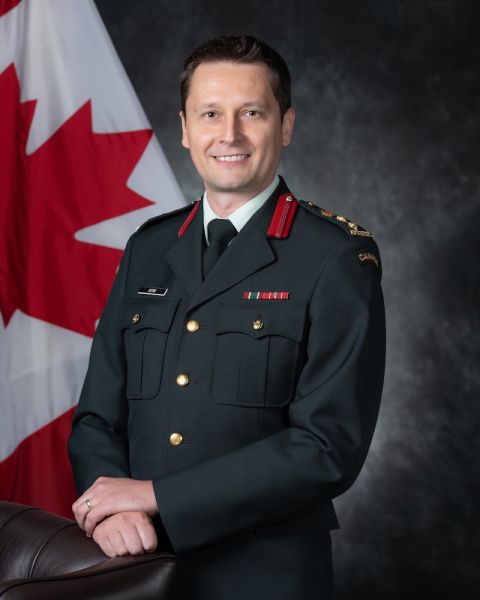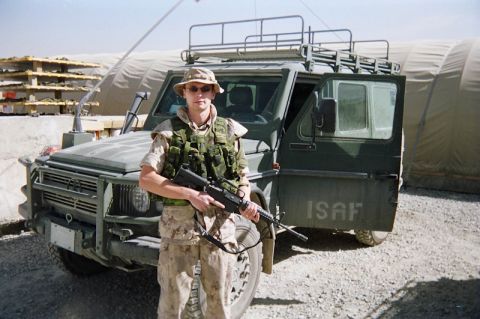

Starting as a signal officer in 1995 and making a 2006 about-turn into military law, Colonel Dylan Kerr, CD, Law’09, became the Canadian Armed Force’s Director of Military Prosecutions just as MPs received the critical Fish and Arbour reports. His battle to preserve the military justice system continues.
He didn’t experience a “eureka moment,” but Dylan Kerr has a vivid memory of how and why he decided to become a lawyer 18 years ago. The reason it’s so vivid is understandable; after having already served for 11 years in the Canadian Armed Forces (CAF), the career change he experienced was as profound as it has been successful for the Hamilton, Ont., native. Now risen to the rank of Colonel, he is two years into a four-year appointment as the service’s Director of Military Prosecutions.
Kerr was just 19 when he joined the CAF in 1995. Nine years later, during his deployment to Afghanistan as Senior Duty Officer at the Canadian Tactical Operations Centre in Kabul, he first began working alongside military lawyers. “I saw how involved they were in almost every aspect of military operations and how trusted they were as advisors to the commander, and I fell in love with the idea of becoming a military lawyer,” he recalls.
“I called home and asked my wife, ‘What would you think if I signed up for another term and went into the military law program?’” She laughed and asked me, ‘What are they doing to you over there?!’”
Going forward, Kerr’s plans for a career change snowballed. And so, within a year of his February 2005 homecoming, he’d written the LSAT (Law School Admission Test) and been accepted into both the CAF’s military law program and first-year law at Queen’s. “Every aspect of law school was fascinating; it was an amazing opportunity,” he says.
Being drawn to criminal law, he understandably was delighted to develop expertise in that area while articling in the Office of the Judge Advocate General (JAG), the CAF’s legal branch. Kerr put that new-found knowledge to use, spending the next 11 years as a military prosecutor. It was work he relished and excelled at, arguing cases before courts martial, the Court Martial Appeal Court, and the Supreme Court of Canada.
Kerr’s performance earned him appointment as a Deputy Director of Military Prosecutions, and, in June 2021, then-Minister of National Defence Harjit Sajjan named him to a four-year term as the Director. It’s in that capacity that Kerr now oversees all military prosecutions in the CAF. The Ottawa-based agency he now heads includes five regional offices, 23 full- and part-time prosecutors, and another seven support staff. The military prosecution service is busy, handling as many as 80 cases each year and providing legal advice to military police investigators across this country and abroad. However, that’s not the only challenge Kerr faces.
He’s leading the CAF’s prosecution service at a time when the need for its very existence is being questioned.
Civilian critics have queried the legitimacy of the CAF military justice system, particularly how it deals with sexual assault cases. This has prompted Kerr to work hard to overcome what he feels are “misconceptions about how the system works.” He also points out, “We’ve had several SCC decisions about its constitutionality and the independence of the various actors, and these decisions have strongly and consistently reinforced the notion that Canada needs a military justice system, that the system is legitimate and constitutional, and that it continues to evolve in accordance with the principles of constitutional law and the Charter.”
Despite that, a debate continues to simmer. It has been fueled recently by a couple of high-profile reviews of the National Defence Act, which sets out the legislative framework for Canada’s military justice system. One of the reviews at issue, a wide-ranging report that included 107 recommendations, was written in 2021 by former SCC Justice Morris Fish. The other, authored by the Honourable Louise Arbour, another former SCC justice, looked at how to deal with the “endemic” issues of misconduct in the military.
Kerr notes that while Arbour’s interim recommendation was that the military cease to exercise its jurisdiction over sexual assault cases, her final recommendation was for Parliament to consider entirely removing jurisdiction for these cases from the military. While that latter prescription was accepted by then-Minister of National Defence Anita Anand (who, coincidentally, taught at Queen’s Law 1999-2005), the details of how to make the necessary procedural and cultural changes remains the subject of discussion and consultation among federal and provincial partners, including the new Minister of Defence, Bill Blair.
“There’s a lot of work being done in the background in terms of if and how DND/CAF might implement the final Arbour recommendation,” says Kerr. “In November 2021, the Provost Marshal (who heads the military police) and I both accepted Justice Arbour’s interim recommendation, and since then I haven’t approved any new charges of sexual assault. (They have gone to civilian courts.) We still have some ongoing cases in the system. We have work to do before all those files are closed, and we’ll see what Parliament decides about whether or not to permanently remove the military’s jurisdiction over cases of sexual assault.”
As for the Fish Report, one of the key recommendations calls for the creation of a set of principles and presumptions that relate to the exercise of concurrent jurisdiction between the Canadian criminal justice system and the military justice system. That’s something that Kerr says he has been working on closely with the heads of the various prosecution services across the country, and he feels that agreement on a set of principles and presumptions is near.
Displaying the same “can-do” optimism and adaptability that drove his 2006 decision to pursue a legal career, Kerr says, “I’m more optimistic than Mme. Arbour on the CAF’s desire to get this right, to address sexual misconduct within the CAF, and continue to improve the military justice system. There’s been considerable and meaningful change, and there continues to be a great deal of effort to improve in all aspects.”
Calling all recent and new Queen’s Law grads
Canada’s Director of Military Prosecutions has a career option for you to consider. Colonel Dylan Kerr, Law’09, says, “If you don’t have a career path in mind, I suggest that you think about joining the Canadian Armed Forces and becoming a military legal officer.”
Why not? There are some compelling reasons to do so.
“Military legal officers enjoy mobility to move between and work in an incredible range of areas of the law,” Kerr says. “They gain great work experience and broaden their view of the world.”
Any recent law grad who has been called to the bar and enlists will enter the military with a Captain’s rank, which carries an attractive starting salary of approximately $88,000 (rising within three years of service to $126,000). After going through the enlistment process and receiving basic officer training, a new military legal officer recruit gets down to work quickly.
“There’s no end of opportunities for rewarding, flexible legal careers in the Office of the JAG,” says Kerr. “Becoming a military legal officer is certainly an attractive option, one that’s well worth considering.”
By Ken Cuthbertson, Law’83